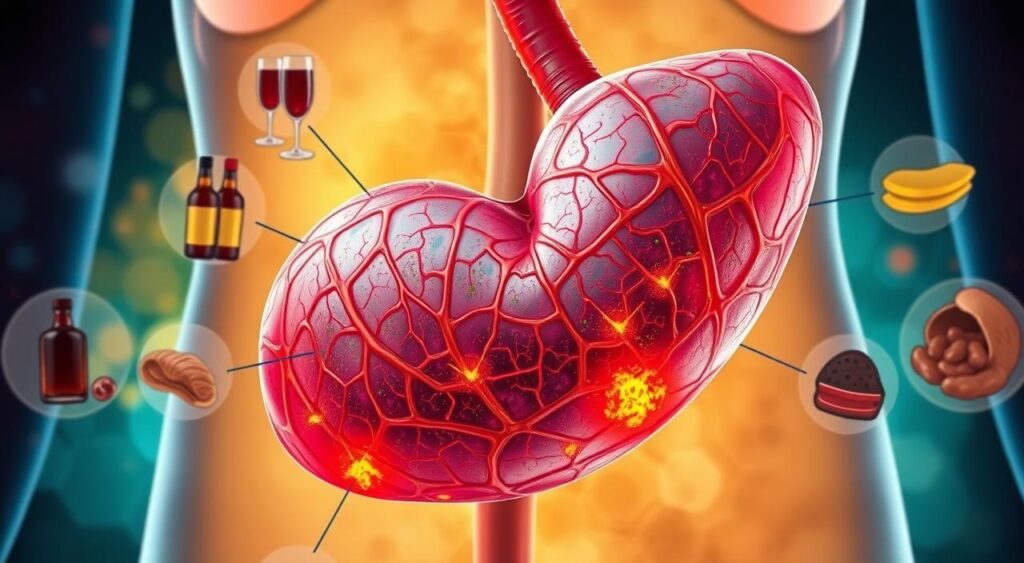Did you know that over 300,000 Americans suffer from chronic pancreatitis each year? This condition causes severe pain and long-term digestive problems. It’s a growing health issue that affects many people’s lives. Knowing the causes, spotting symptoms early, and finding good treatments are key to managing it.
Chronic pancreatitis is a long-lasting inflammation of the pancreas. This organ is vital for digestion and controlling blood sugar. Unlike acute pancreatitis, which can be treated, chronic pancreatitis is a long-term problem. It can cause permanent damage to the pancreas.

Key Takeaways
- Chronic pancreatitis is a persistent inflammation of the pancreas that can lead to permanent damage and dysfunction.
- Common causes include gallstones, excessive alcohol consumption, genetic factors, and autoimmune disorders.
- Symptoms may include severe abdominal pain, nausea, weight loss, and digestive issues.
- Diagnosis involves a combination of medical history, physical exam, and diagnostic tests.
- Treatment options include medication, dietary changes, and in some cases, surgery.
- Early intervention and ongoing management are crucial for managing chronic pancreatitis and preventing complications.
- Lifestyle modifications, such as reducing alcohol intake and maintaining a healthy diet, can help mitigate the risk and progression of the condition.
Understanding Chronic Pancreatitis and Its Impact on Health
The pancreas is a vital organ that plays a crucial role in our digestive and hormonal health. It produces enzymes for breaking down food and hormones like insulin and glucagon for blood sugar regulation. Knowing about the pancreas and the difference between acute and chronic pancreatitis is key to managing this chronic condition.
Role of the Pancreas in Digestive Health
The pancreas makes digestive enzymes like amylase, lipase, and proteases. These enzymes break down carbohydrates, fats, and proteins. Without them, nutrient absorption and digestive function suffer. When the pancreas is damaged, as in chronic pancreatitis, nutrient use is severely impaired.
Difference Between Acute and Chronic Pancreatitis
Acute pancreatitis is a sudden, severe inflammation of the pancreas, often caused by gallstones or alcohol. Chronic pancreatitis, on the other hand, is a persistent, progressive condition with ongoing inflammation and scarring. While acute pancreatitis can be treated, chronic pancreatitis is a long-term, debilitating disorder that can lead to various complications and a reduced quality of life.
Global Prevalence and Risk Factors
Chronic pancreatitis is a global health concern, with incidence rates varying across regions. It is more prevalent in certain parts of the world, such as India and the United States. Factors like alcohol abuse, hereditary pancreatitis, and autoimmune pancreatitis contribute to its prevalence. Understanding these risk factors and global trends can aid in early detection and targeted prevention strategies.
| Region | Prevalence of Chronic Pancreatitis |
|---|---|
| India | 114-200 cases per 100,000 population |
| United States | 50-80 cases per 100,000 population |
| Europe | 25-50 cases per 100,000 population |
“Chronic pancreatitis is a progressive, debilitating condition that can significantly impact an individual’s quality of life. Understanding the pancreas’s role and the differences between acute and chronic forms of the disease is crucial for effective management and prevention.”
Common Causes and Risk Factors of Pancreatitis
Chronic pancreatitis is a complex and debilitating condition. It can arise from various factors. Understanding these pancreatitis causes is key to preventing and managing the disease effectively.
One major cause is alcohol abuse. Drinking too much alcohol can cause inflammation and damage to the pancreas. This makes it hard for the pancreas to function properly.
Genetic predisposition is another significant factor. Some people are born with genetic mutations that raise their risk of hereditary pancreatitis. This form of the disease often starts early in life.
Autoimmune pancreatitis is also a cause. It happens when the body’s immune system attacks the pancreas by mistake. This leads to inflammation and impaired function.
Metabolic conditions like hypertriglyceridemia (high triglycerides) and hypercalcemia (high calcium) can also cause chronic pancreatitis.
Structural problems in the pancreas, such as pancreatic duct stones or pancreatic divisum, can increase the risk of chronic pancreatitis.
| Cause | Description | Risk Factors |
|---|---|---|
| Alcohol abuse | Excessive and prolonged alcohol consumption can lead to inflammation and damage to the pancreas. | Heavy, long-term alcohol consumption |
| Genetic predisposition | Certain inherited genetic mutations can increase the risk of developing hereditary pancreatitis. | Family history of pancreatitis |
| Autoimmune disorders | The body’s immune system mistakenly attacks the pancreas, leading to autoimmune pancreatitis. | Presence of autoimmune disorders |
| Metabolic conditions | High levels of triglycerides or calcium in the blood can contribute to the development of chronic pancreatitis. | Hypertriglyceridemia, hypercalcemia |
| Structural abnormalities | Pancreatic duct stones or divisum can increase the risk of chronic pancreatitis. | Presence of pancreatic duct stones or divisum |
By identifying and addressing these pancreatitis causes, healthcare providers can develop targeted strategies. These strategies can help prevent and manage chronic pancreatitis. This improves the quality of life for those affected by this complex condition.
Recognizing Early Warning Signs and Symptoms
Chronic pancreatitis shows itself in many ways. Spotting these signs early is key to getting the right treatment. Knowing the pancreatitis symptoms helps people get help fast and stop the problem from getting worse.
Physical Symptoms and Pain Patterns
Persistent or recurring belly pain is a big sign of chronic pancreatitis. This pain feels dull and aches, spreading from the upper belly to the back. It often gets worse after eating fatty or protein-rich foods.
People with chronic pancreatitis might also lose weight, feel sick to their stomach, and throw up.
Digestive System Changes
The pancreas is key to digestion, so pancreatitis complications can mess with digestion. Patients might have trouble absorbing nutrients, leading to diarrhea and steatorrhea (too much fat in the stool). This can cause weight loss and malnutrition.
Not having enough pancreatic enzymes makes it hard to digest some foods. This can lead to discomfort and a lack of important nutrients.
Long-term Health Effects
If chronic pancreatitis isn’t treated, it can cause serious long-term problems. The pancreas can get permanently damaged, leading to problems with making hormones and digestive enzymes. This raises the risk of diabetes and other metabolic issues.
It can also make it hard to absorb nutrients, making health problems even worse.
“Early recognition of pancreatitis symptoms is crucial for prompt diagnosis and effective management.”
Diagnostic Process and Medical Evaluations
Diagnosing chronic pancreatitis is complex. It involves many medical tests and evaluations. Doctors start by taking a detailed medical history and doing a physical exam. They check the patient’s symptoms and overall health.
The process to diagnose chronic pancreatitis includes several key steps:
- Blood Tests: Blood tests, like amylase and lipase levels, show how well the pancreas works. They help find any problems.
- Imaging Studies: CT scans, MRI, and endoscopic ultrasound help see the pancreas. They look for any changes or problems.
- Functional Tests: Tests like the secretin stimulation test check if the pancreas can make digestive enzymes.
These tools, along with a detailed medical history and physical exam, help doctors find the cause of chronic pancreatitis. They then create a pancreatitis treatment plan.
| Diagnostic Procedure | Purpose |
|---|---|
| Blood Tests | Assess pancreatic enzyme levels and overall function |
| Imaging Studies (CT, MRI, Endoscopic Ultrasound) | Visualize the pancreas and identify structural abnormalities |
| Functional Tests (Secretin Stimulation, Pancreatic Function Test) | Evaluate the pancreas’s ability to produce and secrete digestive enzymes |
Using a detailed approach to chronic pancreatitis diagnosis helps doctors understand the condition well. They can then tailor the pancreatitis management plan to fit the patient’s needs.
Treatment Options for Chronic Pancreatitis
People with chronic pancreatitis have many treatment options. These help manage their condition and reduce symptoms. A team of doctors works together to find the best treatment.
Medical Interventions
One key treatment is enzyme replacement therapy. It helps the body digest food better. Doctors also use pain medicines to ease the severe pain.
Surgical Procedures
When other treatments don’t work, surgery might be needed. This can include removing part of the pancreas or draining the pancreatic ducts. In some cases, removing the whole pancreas is an option.
Pain Management Strategies
Managing pain is very important. Doctors use medicines and other methods like nerve blocks and spinal cord stimulation. They also use therapy to help people cope with pain.
With the help of a healthcare team, people with chronic pancreatitis can get a treatment plan that fits them. This plan can greatly improve their health and happiness.
Lifestyle Changes and Dietary Modifications
Managing chronic pancreatitis needs a mix of approaches. Lifestyle changes and dietary tweaks are key. People with chronic pancreatitis should eat a pancreatitis diet rich in nutrients but low in fat. This diet supports their health and well-being.
Following a low-fat diet is a top tip for those with chronic pancreatitis. It eases the pancreas’s workload and lowers inflammation and pain risks. Aim for 30 grams of fat daily. Choose healthy fats like nuts, avocados, and olive oil.
Managing pancreatitis also means changing your lifestyle. Giving up alcohol and quitting smoking are crucial. These habits can worsen the condition and harm the pancreas.
| Dietary Recommendations for Chronic Pancreatitis | Lifestyle Modifications |
|---|---|
| Low-fat diet (no more than 30 grams per day) Emphasis on lean proteins, fruits, and vegetables Adequate hydration Supplementation with pancreatic enzymes, if necessary | Alcohol cessation Smoking cessation Regular exercise, as tolerated Stress management techniques |
By adopting these lifestyle changes and dietary modifications, people with chronic pancreatitis can manage their symptoms better. They can also lower the risk of complications and enhance their quality of life.
“A well-planned, low-fat diet is essential for managing chronic pancreatitis and preventing further damage to the pancreas.”

Managing Complications and Secondary Conditions
Chronic pancreatitis can cause many complications and secondary health issues. It’s important to understand and manage these problems well. This is key for those living with this chronic condition.
Diabetes Risk and Management
Diabetes is a common complication of chronic pancreatitis. The pancreas’s damage makes it hard to produce insulin. This leads to insulin resistance and diabetes. It’s crucial to check blood sugar levels often and work closely with healthcare providers.
Nutritional Deficiencies
Chronic pancreatitis can make it hard to digest and absorb nutrients. This can lead to a lack of vitamins, minerals, and proteins. Eating a balanced diet and taking supplements can help. Working with a registered dietitian is also important.
Mental Health Considerations
The pain and challenges of chronic pancreatitis can affect mental health. Depression, anxiety, and other mental health issues are common. Getting help from mental health professionals and joining support groups can be helpful. Stress-management techniques are also beneficial.
| Complication | Prevalence | Management Strategies |
|---|---|---|
| Diabetes | 30-50% | Regular blood sugar monitoring, insulin therapy, dietary modifications |
| Nutritional Deficiencies | 60-90% | Balanced diet, nutrient supplementation, collaboration with registered dietitian |
| Mental Health Issues | 30-60% | Counseling, support groups, stress-management techniques |
By tackling these complications and secondary conditions, people with chronic pancreatitis can manage their health better. This can improve their quality of life.
Prevention Strategies and Risk Reduction
Getting chronic pancreatitis can be tough, but there are ways to lower your risk. Knowing the pancreatitis causes and using good pancreatitis management can help. This way, you can fight or lessen the effects of this chronic illness.
One key step in chronic pancreatitis prevention is to cut down on alcohol. Drinking too much can hurt your pancreas. Try to drink less or stop drinking altogether. Even a little alcohol can make things worse.
Eating right is also important for pancreatitis prevention. Eat lots of fruits, veggies, lean meats, and whole grains. These foods help your digestive system and don’t overwork your pancreas. Stay away from greasy, fried, and processed foods too.
- Limit alcohol to lower inflammation risk
- Eat a diet full of nutrients to support digestion
- Manage conditions like diabetes or gallstones that can lead to pancreatitis
- Keep a healthy weight and exercise regularly for overall health
By tackling known risks and making lifestyle changes, you can prevent or slow chronic pancreatitis. Regular doctor visits are also key. They help catch problems early and offer advice on managing pancreatitis causes and pancreatitis management.
Living with Chronic Pancreatitis: Long-term Outlook
Living with chronic pancreatitis is tough, but it’s possible to live well. It’s all about understanding the long-term outlook and finding ways to manage it. This way, people can still enjoy life despite the challenges.
Adapting to Lifestyle Changes
Managing chronic pancreatitis means big changes in your life. You’ll need to change what you eat, how you handle pain, and make sure you get the nutrients you need. It’s about finding a routine that works for you and taking breaks when you need to.
Emotional and Mental Well-being
Dealing with a chronic illness can be hard on your mind and heart. It’s normal to feel frustrated, anxious, or sad. But, there’s help out there. Talking to doctors, joining groups, and finding ways to relax can make a big difference.
| Aspect | Considerations |
|---|---|
| Physical Health | Ongoing monitoring, medication management, and addressing pancreatitis complications such as nutritional deficiencies or diabetes |
| Emotional Well-being | Coping strategies, support systems, and mental health resources |
| Lifestyle Adjustments | Dietary changes, pain management, and activity pacing |
With the right plan, people with chronic pancreatitis can live full lives. It’s all about working with your healthcare team and finding what works best for you. This way, you can face the future with hope and strength.
Latest Research and Medical Advancements
Medical research is always moving forward, bringing new hope to those with pancreatitis. People with chronic pancreatitis now have access to new treatments and clinical trials. These aim to manage symptoms better, slow the disease, and improve life quality.
Emerging Treatments for Chronic Pancreatitis
New ways to manage pain are being researched. Scientists are looking into targeted nerve blocks and special pain meds. They also explore stem cell transplants to help the pancreas work better.
Clinical Trials and Studies in Pancreatitis Management
Many clinical trials are underway for chronic pancreatitis. They test new surgeries, drugs, and care models. By joining these trials, patients can try new treatments and help advance research.
| Emerging Treatments | Potential Benefits |
|---|---|
| Nerve Blocks | Targeted pain relief, reduced opioid dependence |
| Stem Cell Transplants | Improved pancreatic function, reduced complications |
| Integrative Care Models | Comprehensive, personalized treatment approaches |
As research pushes forward, patients can stay updated and involved. Talking to doctors about new treatments can lead to better care. This means a brighter future for those with chronic pancreatitis, with better symptoms and a higher quality of life.

Conclusion
Chronic pancreatitis is a complex condition that needs careful management and ongoing care. Understanding its causes and recognizing early signs is key. Seeking medical help early can help manage its effects on health.
Managing pancreatitis involves medical treatments, lifestyle changes, and diet adjustments. Keeping up with new research and treatments helps patients make informed choices. Working with healthcare providers is crucial for a personalized plan.
Though chronic pancreatitis is tough, a holistic approach can improve life quality. Focusing on symptom management, addressing causes, and preventing complications is vital. Early diagnosis, regular monitoring, and following recommended treatments are essential for better health and stability.
FAQ
Q: What is chronic pancreatitis?
A: Chronic pancreatitis is a long-term condition that affects the pancreas. This organ is key for making enzymes and hormones. These are vital for digestion and metabolism.
Q: What are the main symptoms of chronic pancreatitis?
A: Symptoms include recurring abdominal pain, nausea, and vomiting. You might also lose weight without trying or have changes in digestion. This can lead to diarrhea or fat in your stool.
Q: What are the leading causes of chronic pancreatitis?
A: Main causes include alcohol abuse and genetic factors. Autoimmune disorders and metabolic issues like high triglycerides and calcium levels also play a role.
Q: How is chronic pancreatitis diagnosed?
A: Doctors use blood tests, imaging like CT scans or MRI, and functional tests. These help check enzyme production and exocrine function.
Q: What are the treatment options for chronic pancreatitis?
A: Treatments include enzyme replacement therapy and pain management. In severe cases, surgery might be needed to remove damaged parts of the pancreas.
Q: How can diet and lifestyle changes help manage chronic pancreatitis?
A: Eating a low-fat diet and taking nutritional supplements is important. Quitting alcohol and smoking also helps manage the condition and prevent further damage.
Q: What are the potential complications of chronic pancreatitis?
A: Complications include diabetes, malnutrition, and mental health issues. It’s crucial to monitor and manage these conditions to maintain health.
Q: Are there any new or emerging treatments for chronic pancreatitis?
A: Research is ongoing for new treatments. This includes better pain management, regenerative therapies, and potential disease-modifying agents. Keeping up with new research can help in making informed decisions.
